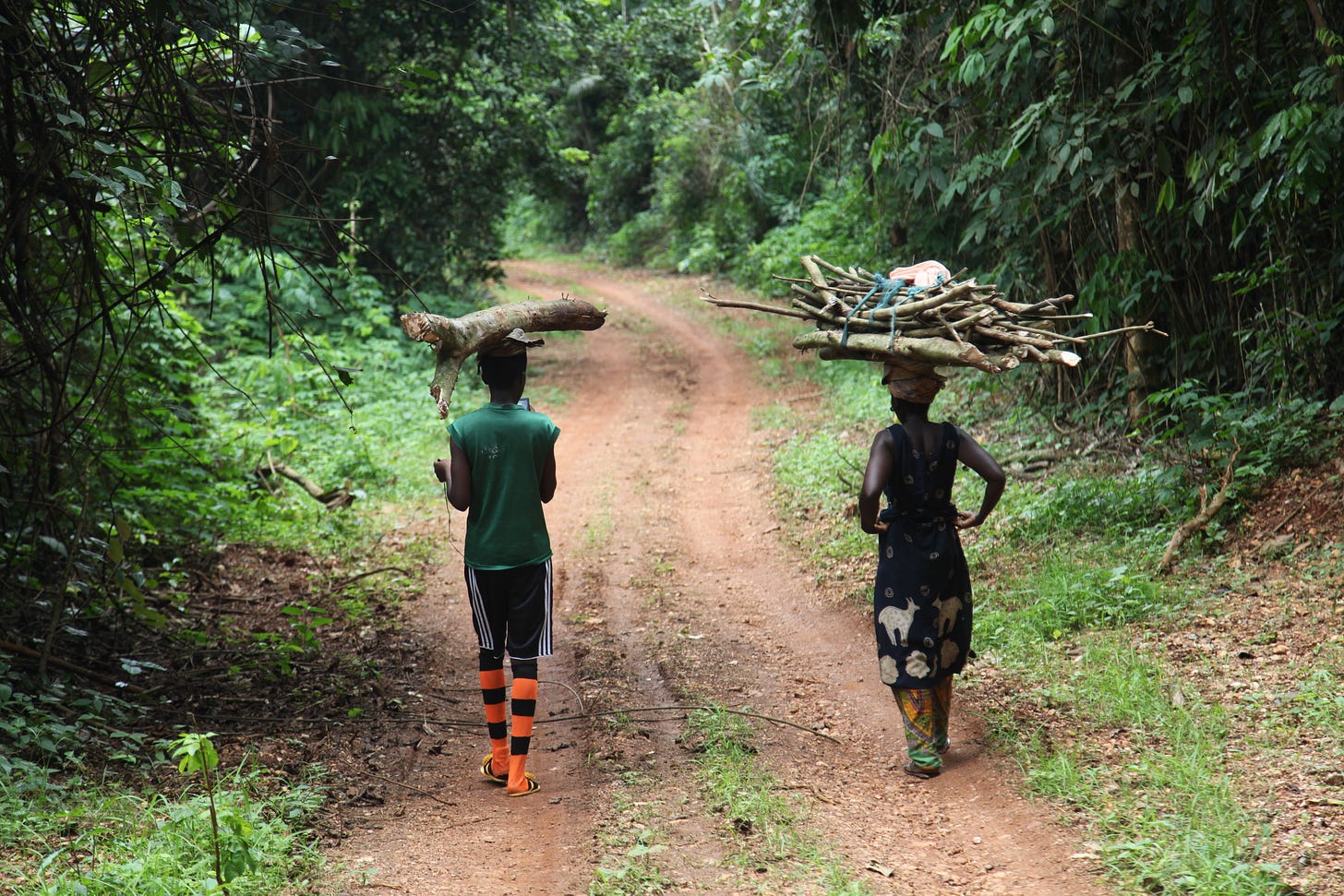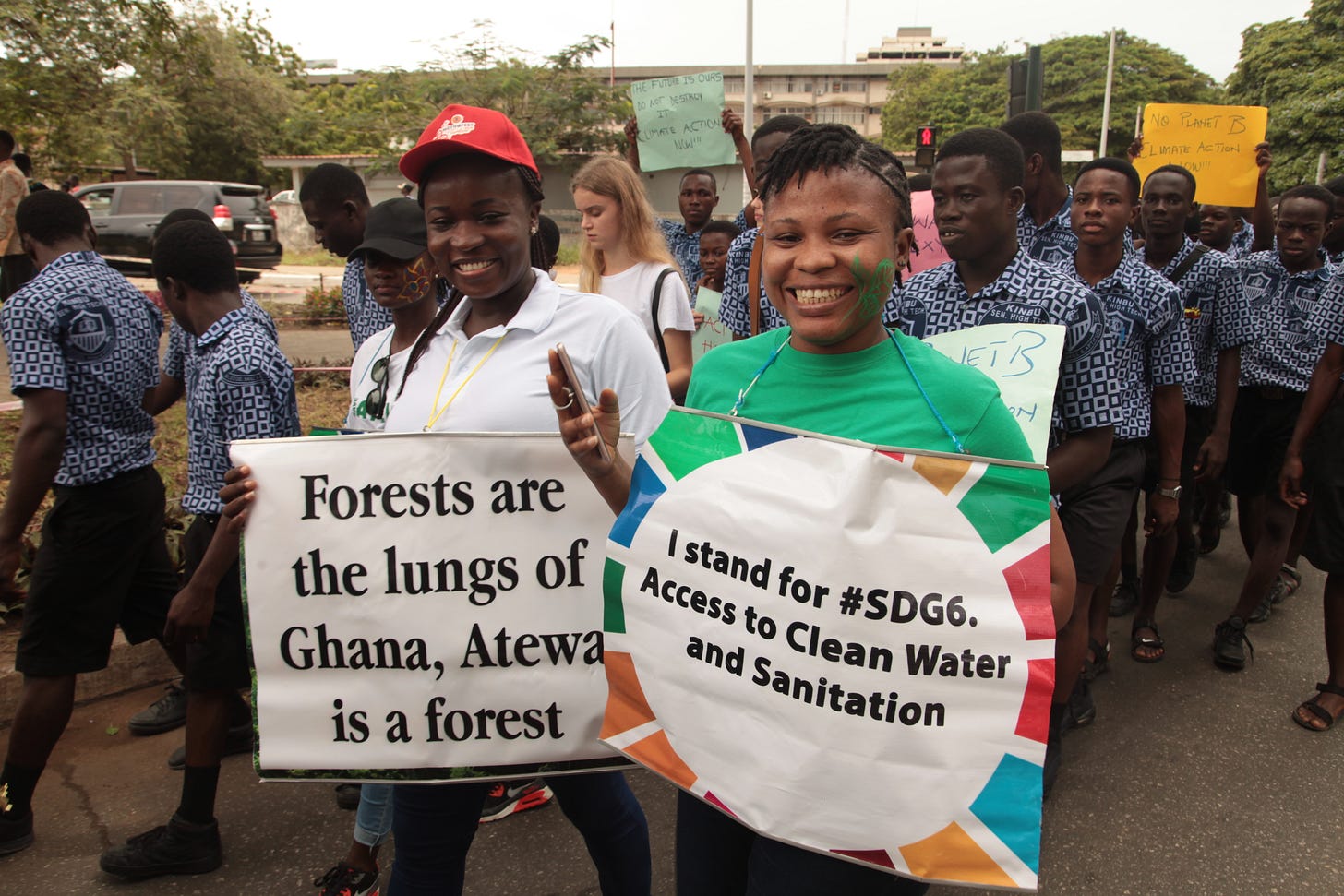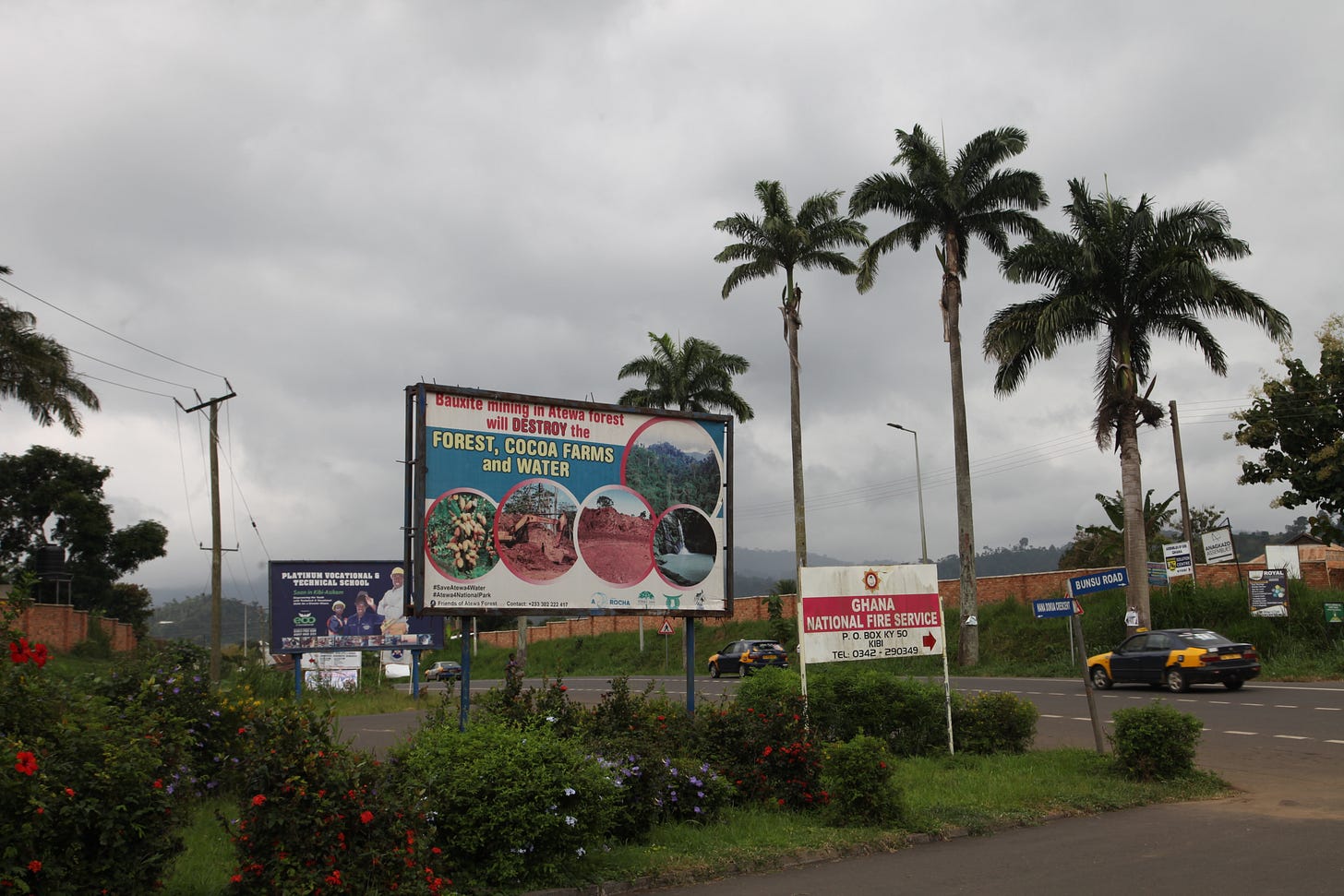Welcome to this latest edition of From a Climate Correspondent. If you'd like to support us, you can invite us for a coffee over at our Patreon page. Thanks for reading!

A mother and daughter collect wood from the Atewa forest - Image credit: Stacey Knott
For the past few years, activists in Ghana have marched, erected billboards, petitioned and gone to local and international media to try to get their government to drop its plans to mine bauxite in a forest reserve. The world-renowned forest is the source of three rivers that serve about five million people in the West African nation.
None of their actions worked - not even when Leonardo DiCaprio tweeted his support. Last month, the activists filed a writ in the High Court, claiming the government's plan to mine in the Atewa Forest Reserve violated the right to life and dignity as enshrined in Ghana's Constitution.
The plaintiffs, a mix of advocacy groups and individuals, point out the government's responsibility to protect and safeguard the environment and to address climate change. They also note Ghana is a signatory to the United Nations Framework Convention on Climate Change and the Convention of Biological Diversity.

Campaigners take part in a September Climate Strike in Accra, advocating the Atewa forest be spared from mining - Image credit: Stacey Knott
The Atewa is a Globally Significant Biodiversity Area with at least 1100 plant species and endemic and threatened butterflies, amphibians, birds and monkeys.
But also in the forest is an estimated 150 million tonnes of the rock which is used to create aluminium products. The government wants to mine the bauxite to boost the economy and create jobs - and to pay back China for a swathe of infrastructural investments across Ghana, in what they call a ‘barter deal’.
While the activists are vocal in their opposition, the government has been light on its details, claiming it will be able to mine in a way that will not affect the water bodies or the wildlife. Campaigners and experts question what kind of technology can do this; bauxite is strip-mined elsewhere.
Protecting nature
I've visited the forest and some of its surrounding communities a few times, and taken in the lush green - a stark contrast to the greys of the capital Accra, about 90 km from Atewa. The soil in this area is red, and passing by the mountainous forest, if you gaze up to the towering mahogany trees, you might not even see the canopy if there are low-lying clouds.
Campaigners want to protect this beauty by seeing Atewa turned into a national park.
Ghana is already rapidly losing its forests. Between 2017 and 2018 it experienced a 60% rise in primary forest loss - the highest rise in any tropical country, according to Global Forest Watch.
A Rocha Ghana, one of the plaintiff groups, has been a leading voice in calling for the protection. Demand for bauxite — the ore in aluminium — is expected to soar as consumer demand increased for lightweight products. But mining the forest makes no sense in the context of the climate crisis, with governments and companies looking for ways to mitigate and adapt to it, like planting more trees, the A Rocha Ghana’s chair Professor Alfred Oteng-Yeboah told me: "It is already there; all these things are already there, why do you have to destroy it?"

A billboard erected by campaigners in Kyebi warns against mining in the forest - Image credit: Stacey Knott
This court action might be the last resort to stop the mining. Speaking to people who live close to the forest, I got a sense that despite the activism they felt helpless, like George Ababio who I met last year on a reporting trip to the area. He worried about where people would get their water from if Atewa is mined.
"It [Atewa] serves the community, but now the government is pursuing to mine the bauxite, so we don't have any option about mining it. But we - the community - we are against the whole show because the forest serves us," he told me.
One unexpected consequence of the current coronavirus pandemic could be to give campaigners and the courts sufficient time to save the forest. Since the pandemic hit Ghana, it seems any action to get into the forest to start mining is on hold. With the case still pending, the plaintiffs and their supporters are holding onto hope their efforts will finally pay off.
Stacey Knott is a multimedia journalist from New Zealand. She has been based in Ghana since 2015. Her reporting work is solutions-focused, especially in the areas of social justice, the environment, urban development and health.
Must-reads from the region
"What Do We Get Out of It?" The Human Rights Impact of Bauxite Mining in Guinea - Human Rights Watch
Guinea has already felt the devastating impact of bauxite mining. This 2018 report from HRW documents the widespread economic and environmental effects those who live near bauxite mines face.
We have cut them all': Ghana struggles to protect its last old-growth forests Awudu Salami Sulemana Yoda, Mongabay
This 2019 investigation looks at Ghana's high deforestation rates; finding illegal logging is common in forest reserves.
Ghana and the rosewood curse - Emmanuel K. Dogbevi, Ghana Business News
Emmanuel K Dogbevi has doggedly been covering illegal rosewood trades in Ghana for years, finding that despite bans and plenty of promises to stop the trade, rosewood is still being felled from the impoverished north of Ghana, and shipped out of the ports in the south.
What else I’ve been reading
My home country New Zealand also has had its share of mining controversies. A friend recently gifted me Tragedy at Pike River Mine: How and Why 29 Men Died by New Zealand journalist Rebecca Macfie. Macfie pours through the coal mine documents, Royal Commission records and extensive interviews to highlight the corporate wrongdoings, and many regulatory issues in this mine where 29 people died ten years ago this November, in what was an avoidable disaster which shook the nation.
Who we are
From A Climate Correspondent is a weekly newsletter run by four journalists exploring the climate crisis from around the globe.
Lou Del Bello is an energy and climate journalist based in Delhi, India.
Jocelyn Timperley is a climate journalist based in San José, Costa Rica.
India Bourke is an environment journalist based in London, UK.
Mat Hope is investigative journalist based in Nairobi, Kenya.
Been forwarded this email?
Did someone send this on to you? Why not sign up yourself!


